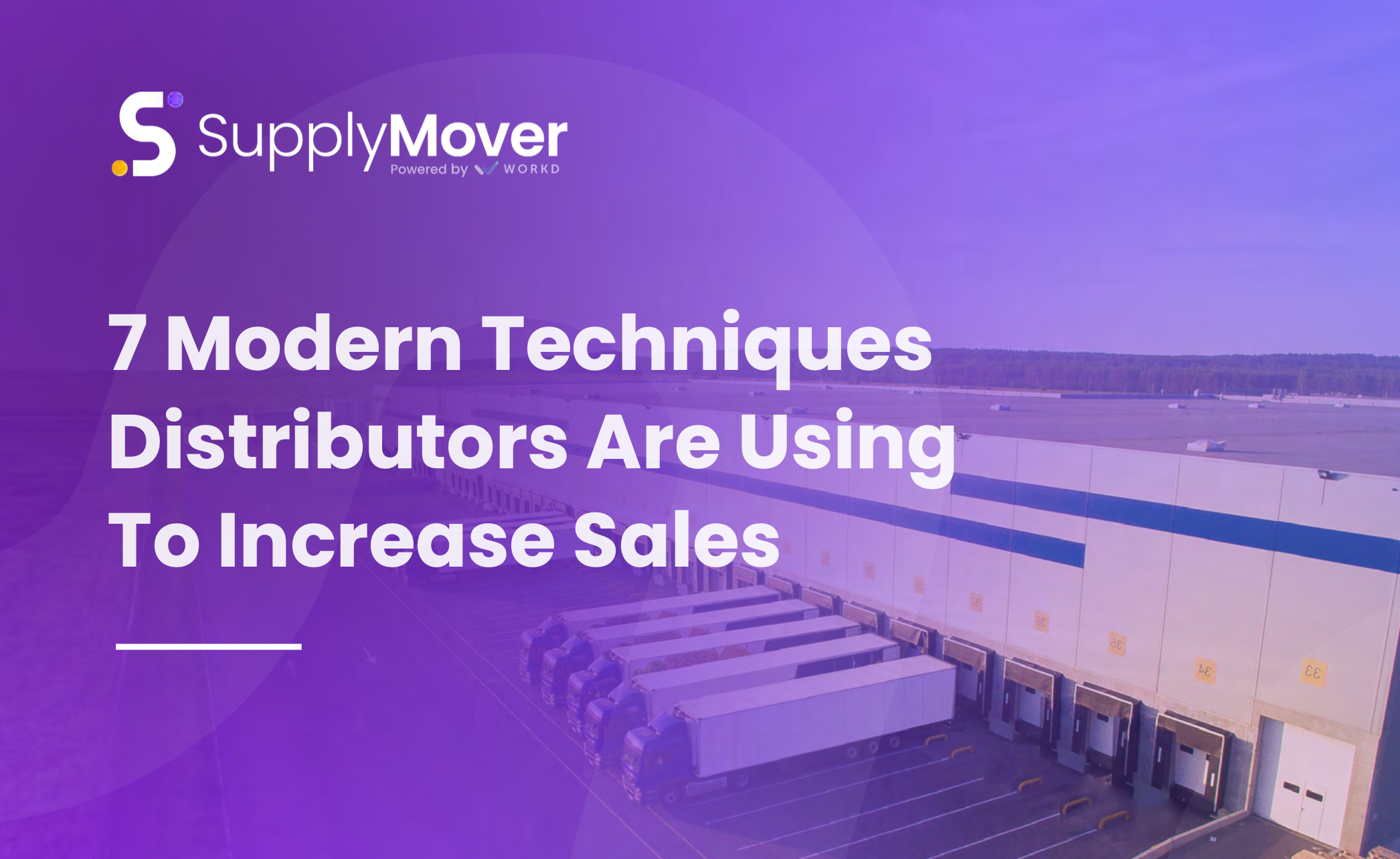AI Adoption in Distribution: A Roadmap to Future-Proofing Your Sales Strategy

The rapid pace of technological advancement has left no industry untouched, and distribution is no exception. Artificial Intelligence (AI) is no longer just a buzzword; it’s a crucial tool for staying competitive. At SupplyMover, we’ve seen firsthand how AI can transform distribution sales, streamlining processes, enhancing customer relationships, and ultimately driving significant revenue growth. But where does your company stand on the path to AI adoption?
In this article, we’ll explore the critical steps distribution companies need to take to assess their readiness for AI, common challenges they may face, and how to create a strategic roadmap for AI adoption that lifts your revenue baseline.
#1: Understanding Your AI Readiness
Where Are You Now?
Before diving into AI adoption, it’s essential to understand your current position. Are your systems ready to support AI, or are you still struggling with data silos and disconnected processes? This self-assessment is the first step in identifying the gaps that could hinder your AI journey.
Common Challenges
Many distribution companies are still operating with outdated systems that don’t communicate with each other. For example, your sales team might be using one set of systems while your operations team uses another. This lack of integration can lead to significant inefficiencies, such as lost or duplicated data, misaligned strategies, and ultimately, a disconnect between different departments. These challenges can make it difficult to get a clear picture of your business operations, hindering effective decision-making and AI integration.
Consider the case of a major global beverage company that faced challenges in managing its vast distribution network across different regions. Before adopting AI, the company struggled with disparate data systems that couldn’t provide a unified view of inventory or customer demand. By implementing AI-driven analytics and machine learning algorithms, the company was able to integrate its data across all departments, enabling real-time inventory tracking and more accurate demand forecasting. This approach helped optimize stock levels, reduce waste, and respond more swiftly to market changes, ultimately improving operational efficiency and customer satisfaction.
Action Step
Conduct a comprehensive AI Adoption Assessment to evaluate your current systems. Identify areas where AI could have the most impact, such as automating repetitive tasks, enhancing customer engagement, or improving data accuracy. Get started with our quick quiz to find out your company stands and what steps to take next!
#2: Laying the Foundation with Data Management
The Role of Data
Data is the backbone of any AI system. For AI to provide meaningful insights and recommendations, it requires clean, interconnected data. Without this, your AI tools might be working with incomplete or outdated information, leading to suboptimal decisions.
Dirty data can lead to disastrous outcomes, especially when AI systems rely on it for decision-making. Recently, a leading data platform faced significant criticism from healthcare professionals due to its suggestions of unsafe and incorrect treatment recommendations for cancer patients. The root cause? The system was trained on artificial data instead of real patient data, leading to these errors. This example underscores the importance of clean, accurate data as the foundation for any AI initiative.
Success Story
Arrow Electronics, like many companies, faced challenges with fragmented data systems. By implementing a centralized data management system powered by AI, they were able to consolidate data from various sources into a single, reliable platform. This transformation helped improve data accuracy, reduce inventory carrying costs, and boost customer satisfaction. Leveraging AI for advanced analytics allowed Arrow Electronics to achieve better inventory management and more strategic decision-making, demonstrating the significant benefits of adopting AI-driven solutions.
What Successful Companies Do
Companies that excel in AI adoption typically have a centralized system where all teams can access a single source of truth. This system ensures that data from different departments is integrated and up-to-date, enabling AI to deliver accurate, actionable insights.
Action Step
Invest in centralizing your data management system. Ensure that all departments are aligned and that your data is clean, accurate, and accessible. This will create a solid foundation for your AI tools to build upon.
#3: Enhancing Performance Management with AI
Aligning Team Goals with AI
Performance management is not just about tracking sales numbers; it’s about understanding the behaviors that lead to those numbers. AI can help by analyzing these behaviors and providing personalized recommendations to improve performance.
Integrating AI into performance management is a step-by-step process. Start by identifying key performance indicators (KPIs) that are crucial for your business. These could include sales volume, customer satisfaction scores, or lead conversion rates. Next, choose AI tools that can analyze these metrics in real-time, providing actionable insights. For example, the leading sales platforms offer AI-driven insights that help sales teams understand customer behaviors and predict outcomes. Such tools can also suggest the best times to contact leads, which products to recommend, and even what messaging will likely resonate most with customers.
The AI Advantage
With AI, you can map input behaviors (like the number of calls made or meetings scheduled) against output results (like closed deals or customer satisfaction). This mapping allows for more targeted coaching and development, helping your sales team to hit their targets more consistently.
AI doesn’t just track what your sales team is doing; it can also analyze how they’re doing it. For example, AI tools can identify patterns in how successful sales reps engage with customers compared to less successful ones. Perhaps the top performers are more consistent in following up or use specific language that resonates with clients. AI can pinpoint these subtle behaviors and suggest them as best practices for the entire team, turning good salespeople into great ones.
Action Step
Implement AI-driven performance management tools that offer personalized growth recommendations. These tools should help your team understand which behaviors drive success and how they can improve.
#4: Revolutionizing Customer Outreach and Prospecting
AI in Outreach
Traditional outreach methods are time-consuming and often yield inconsistent results. AI can automate many aspects of prospecting, from lead scoring to email marketing, allowing your sales team to focus on high-value activities.
What to Expect
AI can help you engage with leads more effectively by providing data-driven insights into their needs and preferences. This not only improves your chances of closing deals but also builds stronger, more personalized relationships with your customers.
Success Story
Netflix is another prime example of a company using AI to enhance customer engagement. By using AI algorithms to analyze user behavior, Netflix provides personalized recommendations that keep users engaged, reducing churn rates and increasing customer lifetime value. While Netflix operates in the entertainment industry, the principles behind its AI use—personalization, engagement, and data-driven decisions—are highly applicable to distribution companies. By adopting similar AI strategies, you can significantly improve how you engage with potential customers, making your outreach efforts more effective.
Action Step
Start integrating AI tools into your outreach and prospecting processes. Use AI to automate email marketing, lead scoring, and customer interactions, freeing up your sales team to focus on closing deals.
#5: Reviving and Strengthening Customer Relationships
The Importance of Retention
In distribution, maintaining strong relationships with existing customers is just as important as acquiring new ones. AI can play a crucial role in identifying at-risk accounts and suggesting actions to revive these relationships.
How AI Helps
AI tools can analyze customer purchase history and engagement patterns to provide personalized recommendations for re-engagement. This proactive approach ensures that your customers feel valued and helps prevent churn.
Success Story
PepsiCo provides a compelling case of AI-driven customer engagement. The company uses AI to analyze consumer data and predict future buying trends. This predictive capability allows PepsiCo to engage with retailers proactively, offering personalized promotions and recommendations that meet their specific needs. The result is stronger retailer relationships and increased sales. Distribution companies can adopt a similar approach by using AI to understand customer needs better and engage them in more meaningful ways.
Action Step
Use AI to track and manage customer relationships more effectively. Implement tools that provide real-time insights into customer behavior and suggest personalized re-engagement strategies.
#6: Shortening Sales Rep Ramp-Up Time
The Challenge
Bringing new sales reps up to speed is a significant challenge in any industry, but it’s especially critical in distribution. AI can help by providing personalized training and coaching, significantly reducing ramp-up time.
AI-Powered Training
AI-powered training programs can dramatically reduce the time it takes for new reps to become fully productive. For example, sales call analysis software can analyze calls and provide feedback on what top performers are doing right. This feedback can then be incorporated into training modules, giving new reps real-world examples to learn from. Additionally, AI can tailor training programs to individual learning styles, ensuring that each rep gets the most out of their onboarding process. This personalized approach not only speeds up the learning curve but also helps new hires feel more confident and capable much sooner.
Comparative Analysis
According to a report by McKinsey & Company, companies that adopt AI-powered training programs often see significant improvements in training efficiency and sales performance. Many organizations have reported that using AI to train their sales force has reduced ramp-up times and increased overall sales performance. For instance, AI tools can provide personalized coaching and real-time feedback, which helps new hires reach full productivity more quickly and boosts their ability to engage effectively with customers. Such outcomes highlight the transformative potential of AI in sales training, making it a critical investment for companies looking to stay competitive in the distribution sector.
Action Step
Implement AI-driven training tools that provide personalized coaching for new sales reps. These tools should focus on key areas like product knowledge, customer engagement, and time management, helping your reps become productive more quickly.
Summary
AI adoption is not a one-size-fits-all process, especially in the complex world of distribution. By understanding where your company stands, laying a solid foundation with data management, and gradually integrating AI into your performance management, outreach, customer relationships, and training processes, you can create a roadmap that ensures long-term success.
Where Do I Start?
Starting with AI can seem a little confusing, and many companies just want to know where they are on this journey. Are you just beginning, or are you further along? What should you focus on over the next 6 to 12 months to make real progress? It’s all about figuring out what’s most important for your business right now.
To help you get started, we’ve created a simple AI Adoption Quiz. This quick and easy quiz will help you understand where your company currently stands and what steps to take next. By taking the quiz, you’ll identify your strengths, uncover any gaps, and learn how AI can enhance your business operations, improve customer satisfaction, and boost sales.
Think of it as a personalized roadmap for your business, guiding you on the best path forward. The quiz is short and straightforward, offering immediate insights and practical tips to help you start making meaningful improvements right away.
Want to know where your company stands and what to focus on next? Take our AI Adoption Quiz today to get a personalized plan for using AI in your distribution sales process.
Discover your
AI Advantage
Discover strategies that your competitors are already using to gain an edge – ensuring you stay ahead of the game.
- 100% tailored to your answers
- Takes about 5 minutes





